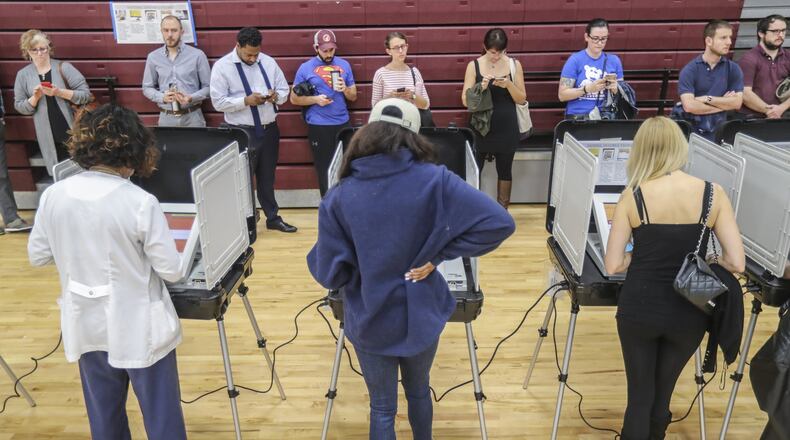The potential for tampering in Georgia’s elections last fall prompted the U.S. Department of Homeland Security to warn election officials to be on guard against foreign interference.
A recently released DHS memo, titled “A Georgia Perspective on Threats to the 2018 U.S. Elections,” listed concerns about hacking, misinformation spread through social media and disruptions to election infrastructure.
The federal advice came as attorneys for state election officials argued in court documents that fears of hacking and vote miscounting were little more than “a theoretical possibility.”
Secretary of State Brad Raffensperger’s office said Monday that cybersecurity has been an ongoing priority since well before the 2018 elections.
“This memo is standard information sharing and shows what all levels of government are doing to protect our elections,” said spokeswoman Tess Hammock. “DHS prepared a similar memo for every state. There is no evidence of any successful attempts to interfere in Georgia's elections.”
The unclassified DHS document became public Wednesday when it was included as an exhibit in an ongoing lawsuit seeking to prevent the continued use of electronic voting machines.
“Foreign governments may engage in cyber operations targeting the election infrastructure and political organization in Georgia and engage in influence operations that aim to interfere with the 2018 U.S. elections,” according to the Oct. 2, 2018, document prepared by the DHS Office of Intelligence & Analysis Field Operations Division for the Southeast Region.
The two-page memo didn't specify who might have attempted to tamper with Georgia's elections, but it said their goals could have been “to disrupt political processes, sway public opinion, or to undermine certain political organizations.”
In July 2016, a Russian agent visited election websites in Cobb and Fulton counties but didn't gain access to election systems, according to the Secretary of State's Office.
The DHS said in a statement Monday that it’s not aware of any specific targeting of Georgia’s election infrastructure in 2018 by a foreign government. The department shared information with state officials across the country before last year’s election.
“These potential tactics are not specific to Georgia systems and could be applicable to elections across the United States,” said spokesman Scott McConnell. “Election security is national security, and we are continuing to engage our election partners as part of a collaborative effort to protect the 2020 election.”
Jeanne Dufort, a voter worried about election security, said Georgia election officials should do more to ensure safe elections.
“Our election officials said, ‘There’s nothing to see here, there’s nothing to worry about,’ ” said Dufort, a real estate agent in Madison. “I wish they would treat election safety the way most of us treat our personal home safety. We take reasonable precautions, we listen to experts and we try to protect ourselves rather than saying there’s no problem unless someone can prove there’s a problem.”
Potential threats identified by DHS included:
- Unauthorized entry into polling places or voting facilities used to store election equipment.
- Emails sent to government agencies, including the state's department of motor vehicles, that include malicious links that could be used to hack voter registration systems.
- Attempts to hack or disrupt the processing of absentee ballots sent through the U.S. Postal Service.
- Social media messages or robocalls falsely reporting changed or closed polling locations.
- Disruptions to polling places such as power failures or internet, cellphone and traffic control outages.
About the Author
Keep Reading
The Latest
Featured




